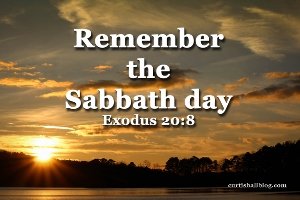Resting in Christ – Hit the Mark
I wish I had understood the Sabbath much earlier in my Christian walk. I’ve been a Sabbath keeper for decades. I was born into a Sabbath-keeping family with many Sabbath-keeping relatives. I’ve calculated that I’ve willingly “kept” the Sabbath over two thousand times. Yet, for most of those past years I can honestly say that I missed the mark in my Sabbath observance.

Photo by Curtis Hall
This week as we talk about Resting in Christ, we have the opportunity to reexamine what the Sabbath is all about. It’s more than a day off work, and it’s more than a day in church. The Sabbath means much more.
I know all too well the verbal importance we place on the Sabbath. Many of us, including myself, have at times used the facts of the Sabbath as an evidence of theological superiority. It’s biblically indisputable that the Sabbath is still binding upon man. Those that claim that it was done away at the cross find themselves without a foundation with simple questions such as, “Were all of the other commandments done away with also?”
Proving the validity of the Sabbath is easy. Understanding why we keep it seems a much harder task.
We say that we keep it as a sign between us and God and indeed, that is what the bible records.
“Hallow My Sabbaths, and they will be a sign between Me and you, that you may know that I am the Lord your God.” Ezekiel 20:20
There are two questions that must be answered as we contemplate this and similar verses. First, what does it mean to hallow (keep holy) the Sabbath and how does this prove that God is our God?
Answering the second question will make it easier to answer the first. Let’s begin at the beginning. The book of Genesis records the creation of our world. It is impossible to completely conceive what that means. Our world, with its teeming life in the seas, on land and in the skies is nothing short of miraculous. No theories of galactic accidents can begin to explain the order of our planet as it hangs in space. There must be a God somewhere.
“And on the seventh day God ended his work which he had made; and he rested on the seventh day from all his work which he had made. And God blessed the seventh day, and sanctified it: because that in it he had rested from all his work which God created and made.” Genesis 2:2-3
The Sabbath is a memorial of this creative power of God. It is a weekly reminder that God is all powerful. That’s our first clue on why we keep the Sabbath. We keep it as a sign of our allegiance to God and, just as importantly, our dependence upon God. Here’s one of the conclusions of accepting this understanding of the Sabbath – I acknowledge God’s sovereign power.
You might be thinking what’s so revolutionary about that. Using my history as an example I know that I failed to draw this conclusion from the keeping of the Sabbath. Somehow, my past observance of the Sabbath tended to lead to setting my affections on the gifts given to man and not the Giver of the gifts. Let me explain.
In the culture that I grew up in (which still exists) much of the Sabbath revolved around what happens inside the local church. A good sermon capped off with some good music was the unspoken hope of attending church. I know I’m not alone in this. It’s how we do church. The more popular the speaker, the more people attend. The more popular the singer, the more people rejoice. While it may be hard to admit it, for many of us, our Sabbath-keeping is centered on attending church. And that is where I have missed the mark.
If the Sabbath is a sign of God’s creative power it would make sense that I spend part of my Sabbath where that witness is most evident – outside in nature. There is nothing that illustrates the power of God in such profound ways as what we find in nature. And for a large part of our church family, time spent in nature is not a regular part of our Sabbath observance. And for some, it’s never a part.
One of the arguments we often hear against the Sabbath is that it doesn’t matter what day you keep as long as you worship God. We dismiss that argument as illogical because God specifically said that he “sanctified” (i.e. “made holy’) the seventh day – something He said about no other day. However, we use a similar argument in regard to spending time in God’s creation.
We, as a church, have abundant prophetic insight and instruction on the benefits of nature and how it builds our faith and its ennobling power. Yet we will say to ourselves that it doesn’t really matter as long as we worship God.
Here’s why it does matter. We need all the evidences of God’s power and love for us that we can gather. The more we can grasp that, the less we will worry about today and tomorrow. The more we can grasp that, the less we will be plagued with stress and the diseases that come in its wake. Resting in Christ means living a life of trust in divine power. Knowing God better must be the motivation of our lives.
“And this is life eternal, that they might know thee the only true God, and Jesus Christ, whom thou hast sent.” John 17:3
This leads to the answer of the first question on how to observe the Sabbath. We must make Sabbath more than what happens at our local churches. It’s proper and good to come together to fellowship. It’s a blessing to hear the word of God, share in group bible study and to hear testimonies of God’s goodness. It’s a positive force to band together as church members and to do good in our communities. But Sabbath must be more than time spent in church. It must be more than a day off of work. It must be a conscious decision to learn more about the God we serve and we short circuit this process when we fail to take advantage of God’s greatest lesson book – nature.
There are many of our world-wide church family who live in settings where this is not a challenge. Others are not so fortunate and live in urban settings where the Sabbath nature experience is not as easy as opening the front door. I’m glad God does not leave us alone to figure out how to do what He asks us to do.
“In all thy ways acknowledge him, and he shall direct thy paths.” Proverbs 3:5
Here are a few Hit the Mark questions for this week’s lesson discussion:
- What does “resting in Christ” mean to you?
- Is it true that the greater my trust in God, the less I will worry about anything? Explain your answer.
- What does it mean to keep the Sabbath holy?
- What does it mean to “do good” on the Sabbath?
- Reflection Question One: Why do you keep the Sabbath (besides it being a commandment)?
- Reflection Question Two: How do you keep the Sabbath?
- Is the following statement True, Mostly True, Somewhat True or Not True: People who properly observe the Sabbath are nicer, kinder, humbler and more loving than people who don’t. Explain your answer.
We close this week’s lesson with an invitation given by Christ. Our Sabbath observance should help make this a reality in our lives.
“Come to Me, all you who labor and are heavy laden, and I will give you rest. Take My yoke upon you and learn from Me, for I am gentle and lowly in heart, and you will find rest for your souls. For My yoke is easy and My burden is light.” Matthew 11:28-30
Until next week, let’s all continue to Hit the Mark in Sabbath School!
Click HEADPHONES for Audio Version

